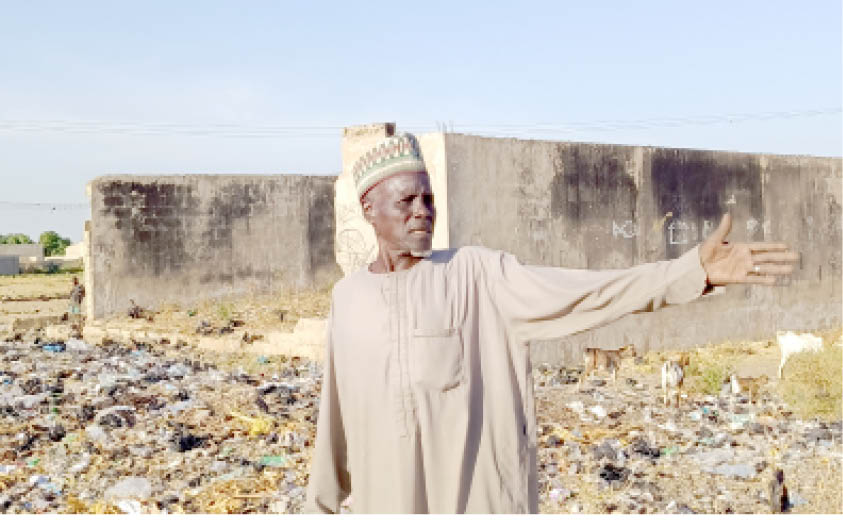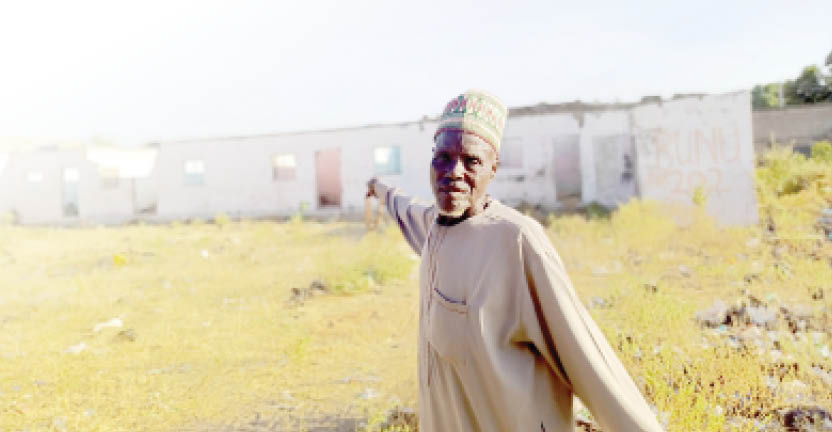The abandoned home and administrative headquarters (markas) of late Boko Haram founder, Mohammed Yusuf, near the Railway Terminus in the heart of Maiduguri, Borno State, is fast fading from the history of insurgency in Nigeria.
The markas was where Boko Haram terrorists fired the first shots that placed Nigeria on the world terrorism map.
The relic was once the sacred shrine of Yusuf which was demolished by authorities in 2009 shortly after he and his followers declared war against the Nigerian state, an event that claimed thousands of lives and is still counting.
Fourteen years on, the ruins of the markas which harbours criminals and with no clarity of what the government wants to do with the place have remained a haunting landmark for families of people killed in the insurgency.
However, experts say that the relics of death and destruction like in the markas in other climes are preserved to mark turning points in history and avail governments the opportunity to change the narratives.
“In other climes, the place will not be abandoned. The federal government should collaborate with the Borno State Government and convert the place into a monument. They should find a way of preserving the rubble for tourists and researchers. People from all over the world will like to come and see where the notorious Yusuf lived,” said a lecturer at the University of Maiduguri.
Dr Ismaila Suleiman of the History Department, Bayero University Kano (BUK), is of the opinion that that memory is usually dislodged “because you don’t want to memorialise or commemorate your enemy.”
He said, “If you want to commemorate wars for lessons to avert similar occurrences, then you can keep that, but then frame the narrative and the monument in such a way that it will highlight your own part of the story so that you don’t memorialise criminals.”
Citing an example with the September 11, 2001, attack in New York, he said, “The US has invested a lot of money to memorialise the September 11 incident, and you know what that stands for the US foreign policy, American democracy and the victims.”

Suleiman advised that the structure should be demolished “but some of his belongings can be kept in a museum so that his memory will not be completely eroded because our children will be interested to see them after reading history books; but not preserving his whole quarters.
“I don’t think it is strategic as far as state policy is concerned. There are war museums and memorials all over the place to immortalise veterans’ sacrifices.”
Another expert said, “It’s the same thing that led us to the situation of Biafra, because the government didn’t know how to take that history into good perspective. If you don’t know how to manage the past, then you are bound to repeat it again and again.
“Can’t you see, even in 2022, there were films on World War II that happened in 1945, telling the history in ways that fit into present circumstances, into present narratives or into how they want the whole issue to be remembered.”
The rubble
When Daily Trust Saturday visited the area, residents complained that criminals have now taken over the demolished markas, unleashing terror mostly at night on passers-by.
A resident, Sadiq Ibrahim, complained that the major challenge facing them in the area was the moral decadence among youths and children, which he noted was breeding another nuisance.
He said, “You will see little boys with bad haircuts, some taking drugs and attending night clubs and all of that.
“Once it’s 8pm, people don’t follow the markas area because hoodlums will attack you and seize your valuables. That’s why many people are calling on the government to build a school there.
“But for me, let the government establish a company that will employ the youths to take them off drugs and other social vices. If you establish a school there, many of us that still live with the trauma of what happened will be afraid to send our children.”
Another resident, Bakura Modu, said the markas boys targeted evening and night commuters near the sharp bend of the enclave.
He said, “They lurk around the rubble of the structure to take drugs, smoke Indian hemp and attack people. Not quite long, they attacked a man and injured him.”
Adam Tela, a resident, said, “They will brandish a knife and ask you to surrender your belongings. If you resist, they will injure you and take what they want. My house is nearby but I always make sure I go back home before 5pm.”
Falmata (21) said the miscreants also harassed women.
She said, “I don’t want to talk about this, but there is a need to clear the place. They once collected my phone and money. They have done this to some of my friends and to many visitors. They are committing many atrocities.”
Babagana Makinta, a community
Leader, decried that the place had been turned into a den of criminal activities and advised the government to establish a school there.
Makinta said, “The genesis of the Boko Haram crisis was lack of good education. Most of the people that joined the sect were illiterates who lacked backgrounds of both religious and Western education.
“We thank Gov Zulum for constructing roads and boreholes close to the area for the traumatised residents to rebuild their lives, but we don’t have a good school; which is very critical considering the situation we are in right now.”
Also commenting on the situation, Muhammad Bukar, who was born and brought up in the area, said he did not go into exile throughout the crisis period.
He said, “I stayed back even when people deserted this place. The only time I slept outside my house was when a deadly attack caught up with me in the town and a curfew was imposed. That was how I spent two days in my friend’s house.
“Now, the Boko Haram crisis has ended and peace is gradually returning. That is why we want the government to pay much attention here.”
He noted that apart from the criminals that constituted threats around the markas area, a night club was booming close to the place and had been a bad influence on many youths.
He further said, “We want the government to intervene and relocate them elsewhere because it’s ruining the characters of our young girls while feeding the markas area with criminals.
“Not only the markas, we also want the government to convert the moribund railway station to a hospital or police station so as to avoid a repeat of the situation we found ourselves in.”
Chukwuemaka Emmanuel Ani, another resident who has a school in the area teaching Western and Islamic education, said, “If we educate them and disabuse their minds, they would be the ones to help us in future.”
Markas before demolition
Baba Usman Mele, a security guard at the railway station, described the situation as terrifying and that it needed urgent action.
He said, “We have had enough from 2009; blood spilt everywhere. Our women, children and many breadwinners were caught up and died in that avoidable crisis.
“We have really suffered. There is no resident in this area that does not have a bitter story to tell. We all went into exile but returned later when the situation subsided because this is the only place we call home.
“We are appealing to the government to come and do something here.”
When asked whether they have reported the ugly trend to the government, he said, “We have not because most of those doing these things are not strangers. They live with people here as good people in the day and turn into monsters at night.”
Mele, who claimed he fought the Biafra war, further said his security background was enough to tell him that the activities of the hoodlums were a potential threat to the relative peace being enjoyed in Maiduguri.
Folding up his trousers, Mele pointed to a scar on his leg, saying it was pierced by a bullet during the Biafra war.
He added that, “I have nothing to fear, but I don’t want anything to happen to my wife and eight children.”
Mele took our correspondent around the structure, painting a picture of how the markas looked before it was demolished by the authorities.
Pointing to a lone pillar, Mele said it’s the only symbol of the mosque’s area where Yusuf brainwashed his disciples and ignited the fire that consumed him, his followers and other lives.
He said, “A lot of lives were lost here. You see this ditch, it’s still scary to me knowing the kind of horror and decomposed bodies I saw inside. Bodies littered everywhere. All these rags you see are the clothes worn by those killed.”
Leading this reporter to a large hall and a block of four rooms painted pink, Mele said, “This was where the family of Mohammed Yusuf lived. The hall was a kitchen where food was cooked for the family and his disciples.
“Now, all these places have been converted to criminal hideouts.”
Speaking further, Mele said aside Yusuf he knew Abubakar Shekau, Mamman Shitta and other Boko Haram leaders before the crisis.
He said, “I was only spared to live here when they discovered that I was an uneducated old soldier.”
When contacted, the police spokesman in Borno State, Muhammad Shatambaya, said they received complaints from residents of the area when the new Commissioner of Police (CP) arrived in Maiduguri and that they made some arrests.
He said, “Our surveillance team went into the place and made arrests. Some were paraded while others were taken to court.
“I’m also calling on the residents to contact us through our control room numbers whenever they need our help.”
While some of the residents are optimistic about the future of the area, calling for infrastructural development, others call for the establishment of a police station to defuse the network of bad people already posing a threat to the relative peace being enjoyed in the town.

 Join Daily Trust WhatsApp Community For Quick Access To News and Happenings Around You.
Join Daily Trust WhatsApp Community For Quick Access To News and Happenings Around You.


